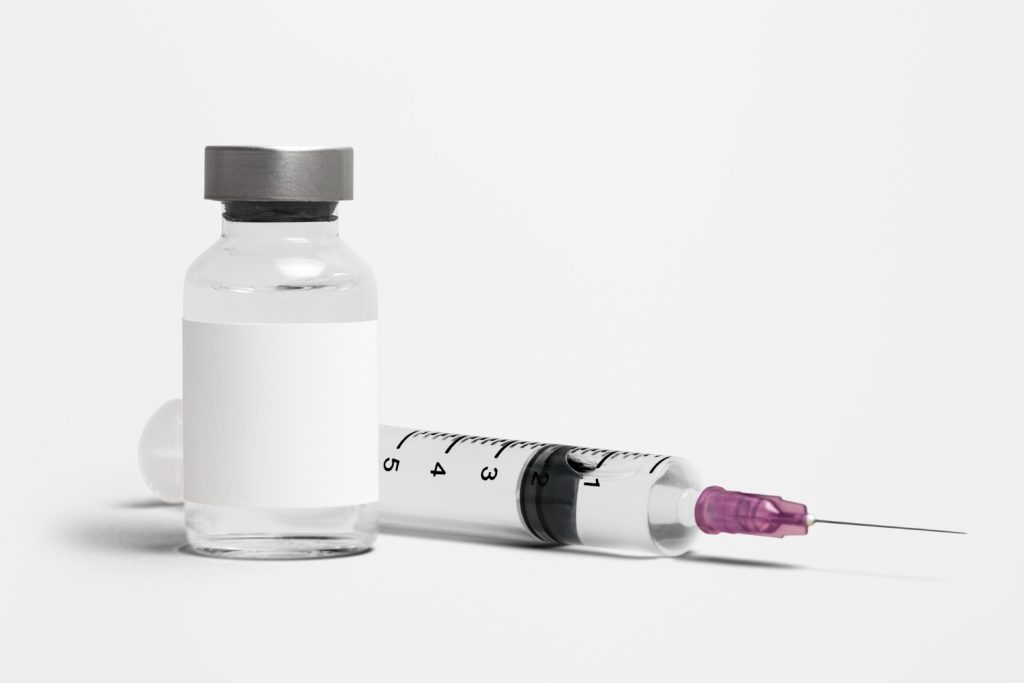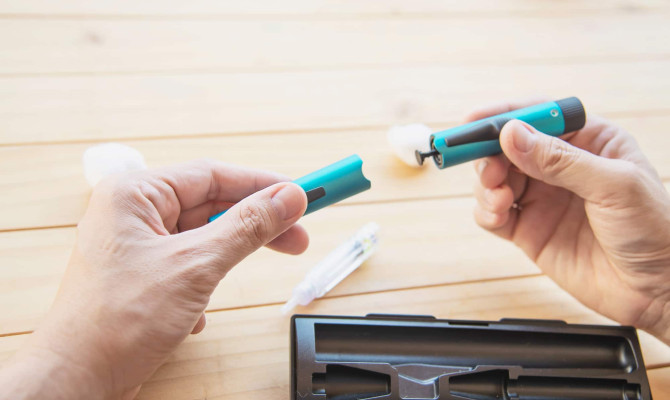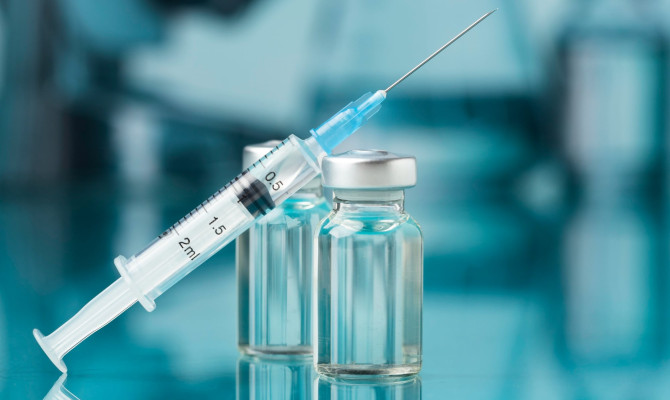Lupron Depot: Exploring Its Benefits, Medical Uses, Side Effects & Precautions

- Lupron Depot
- 03 Oct 2023
Introduction
Lupron Depot
The compound known as leuprolide acetate is an outstanding example of artificial innovation in the field of medicine. As a synthetic non peptide, it has the potential to make significant changes in the healthcare field. Serving as a highly effective agonist for the gonadotropin-releasing hormone receptor (GnRHR), Leuprolide acetate has been used in a wide range of clinical applications, assisting various conditions such as prostate cancer, endometriosis, uterine fibromas, early puberty and in vitro fertilization procedures. 1 Introduction | Researched based study from National Institutes of health Leuprolide acetate is the generic name for Lupron Depot, which falls under the category of gonadotropin-releasing hormone (GnRH) agonists. It has gained prominence for its ability to affect hormonal balance, making it a versatile tool in the management of various conditions.

Mechanism
Mechanism of Action
- Lupron Depot’s mechanism of action revolves around its impact on the hypothalamus-pituitary-gonadal axis.
- At first, it stimulates the release of luteinizing hormone and follicle-stimulating hormone, but later it suppresses their release. 2 Mechanism of Action | Researched based study from National Institutes of Health
- This results in decreased production of sex hormones such as estrogen and testosterone, making Lupron Depot a potent tool in treating conditions fueled by hormonal imbalances.
Uses

Medical Uses of Lupron Depot
Let’s explore some of the key uses of leuprolide acetate:
- Endometriosis
- Uterine fibroids
- Prostate Cancer
- Central Precocious Puberty
- In Vitro Fertilization (IVF)
Endometriosis:
- Lupron Depot has been widely used to manage endometriosis, a condition where endometrial tissue grows outside of the uterus.
- It can alleviate symptoms like pain and discomfort by suppressing estrogen production and for the time being inducing a state similar to menopause. 3 Medical Uses | Researched based study from ScienceDirect
- Leuprolide shuts down estrogen production, and with no estrogen, the endometrial glands go dormant.
- The growth of uterine tissue outside the uterus is reduced by this, which helps alleviate the pain associated with endometriosis.
Uterine Fibroids:
- Uterine fibroids, which are not cancerous, can cause pain and other complications in the uterus.
- The suppression of estrogen production by Leuprolide acetate causes fibroids to shrink, making it a valuable preoperative treatment to reduce fibroid size before surgery.
Prostate Cancer:
- Leuprolide acetate is a crucial component in the battle against prostate cancer, a condition that is commonly caused by testosterone.
- The growth and progression of prostate cancer cells can be prevented by suppressing the secretion of luteinizing hormone (LH) and follicle-stimulating hormone (FSH), which effectively reduces testosterone production.
Central Precocious Puberty:
- Leuprolide is a treatment for central early puberty, which is a condition where children experience puberty at an unusually early age.
- By temporarily stopping the release of sexual hormones, it can delay the onset of puberty, allowing children to grow up before experiencing the physical changes associated with puberty.
In Vitro Fertilization (IVF):
- Leuprolide acetate is used in IVF to suppress the natural menstrual cycle.
- By synchronizing the timing of follicle growth and egg retrieval during assisted reproductive techniques, there is a chance of a successful pregnancy.
Investigative Uses:
- Research is currently underway to determine its effectiveness in addressing conditions like Alzheimer’s disease, polycystic ovary syndrome, functional bowel diseases, and short stature.
- Furthermore, it is being considered as a substitute for managing premenstrual syndrome and contraception.
Benefits
Benefits of Lupron Depot
Lupron Depot offers several benefits, such as symptom relief and improved quality of life for those dealing with conditions like endometriosis. It’s a non-surgical option for fibroid treatment, and in prostate cancer, it can slow the progression of the disease. Temporary menopause-like symptoms, potential bone density loss, and the cost of treatment are among the factors patients and healthcare providers must weigh.
Endometriosis Treatment:
- Reduces Pain: Decreases pelvic pain and distress due to endometriosis.
- Inflammation Reduction: Controls inflammation, easing symptoms like painful menstruation and intercourse.
Prostate Cancer Treatment:
- Hormone Suppression: Decreasing testosterone levels leads to a slowdown in prostate cancer growth.4 Benefits| Researched based study from Oxford Academic
- Tumor Shrinkage: Reduces tumor size by depriving cancer cells of hormones.
Fertility Treatment:
- Controlled ovulation: Regulates ovulation in procedures like in vitro fertilization (IVF).
- Improved Success Rates: Enhances embryo implantation and pregnancy chances by maintaining hormone levels.
Uterine Fibroid Control:
- Fibroid Shrinkage: Temporarily reduces uterine fibroid size, easing symptoms like heavy menstrual bleeding.
- Central Precocious Puberty Management: Delayed Puberty Onset: Inhibits sex hormone release, delaying early puberty and promoting normal growth.
Breast Cancer Treatment (off-label use):
- Hormone Blockade: Can help treat hormone-sensitive breast cancer by suppressing estrogen production.
Administration
Administration & Dosage of Lupron Depot
Lupron Depot is administered through an injection, typically given every one, three, or six months, depending on the specific medical condition being treated.
- Injection: It is given as an injection.
- Frequency: It is common to receive it once every few weeks or months.
- Location: Injections can be given either through the muscle (intramuscular) or through the skin (subcutaneous).5 Administration and Dosage | Researched based study from United States Food and Drug Administration
Dosage
- Endometriosis: Common dosage is 3.75 mg to 11.25 mg every 4 to 12 weeks.
- Prostate Cancer: Dosage varies but can range from 7.5 mg to 45 mg every 1 to 6 months.
- Fertility Treatment: Dosage depends on the assisted reproductive technique being used, often in conjunction with other medications.
- Uterine Fibroids: Dosage may range from 3.75 mg to 11.25 mg administered every 4 to 12 weeks.
- Central Precocious Puberty: Dosage depends on the child’s weight and can range from 7.5 mg to 15 mg every 4 weeks.
- Breast Cancer (off-label use): The doctor determines the dosage, and it can vary.
Remember, dosages can differ based on factors like individual patient needs, condition severity, and the healthcare provider’s recommendations.
Interactions
Drug Interactions Involving Lupron Depot
GnRH Agonists/Antagonists:
- Concurrent use of other GnRH agonists or antagonists might lead to an excessive decrease in hormone levels, potentially causing unwanted effects.
Hormonal Medications:
- Combining Lupron Depot with other hormonal medications could disrupt hormone balance and affect treatment efficacy.6 Drug Interactions | Researched based study from National Institutes of Health
Herbal Medicines:
- The effectiveness of Lupron Depot may be reduced by St. John’s Wort and certain herbal medicines.
CYP3A4 Inducers/Inhibitors:
- Medications that induce or inhibit the enzyme CYP3A4 might impact the metabolism of Lupron Depot, affecting its effectiveness or side effects.
Corticosteroids:
- Concurrent use of corticosteroids might influence the efficacy and side effects of Lupron Depot.
Antiandrogens:
- Combining Lupron Depot with antiandrogens might enhance the reduction of testosterone levels, leading to more significant hormonal changes.
Anticoagulants:
- Interaction with anticoagulant medications could potentially impact blood clotting factors.
Side Effects
Side Effects of Lupron Depot
As with any drug, Lupron Depot may have drawbacks.
Common Side Effects:
- Hot Flashes: A sudden feeling of warmth that often leads to sweating.
- Fatigue: Generalized tiredness and lack of energy.
- Headache: Mild to moderate headaches.
- Injection Site Reactions: The injection site can cause discomfort, inflammation, or a bit of redness at the site.
- Mood Changes: Mood swings, depression, or anxiety.
- Decreased Libido: Reduced sexual desire.
Gastrointestinal Effects:
- Nausea: Feeling of queasiness or an upset stomach.
- Vomiting: Forceful expulsion of stomach contents.
- Constipation: Difficulty passing stools.7 Side effects | Researched based study from National Institutes of Health
Musculoskeletal Effects:
- Joint Pain: Discomfort or achiness in joints.
- Muscle Aches: Pain or soreness in muscles.
Dermatological Effects:
- Dry Skin: Skin feeling dry and rough.
- Acne: Development of pimples or skin blemishes.
- Sweating: Increased sweating, especially at night.
Metabolic and Hormonal Effects:
- Weight Gain: Increase in body weight.
- Raised Blood Sugar: A temporary increase in blood sugar levels.
- Changes in Cholesterol Levels: Alterations in cholesterol profile. 7 Side effects | Researched based study from National Institutes of Health
Bone Health Effects:
- Bone density has decreased: Long-term use could lead to a decrease in bone
- density.
Cardiovascular Effects:
- Palpitations: Awareness of heartbeat, often faster or irregular.
- High Blood Pressure: Elevated blood pressure levels.
Reproductive System Effects:
- Menstrual Changes: Irregular or absent menstrual periods.
- Vaginal dryness: Decreased vaginal lubrication.6 Side Effects | Researched based study from National Institutes of Health
Other Possible Effects:
- Osteoporosis Risk: Increased risk of osteoporosis with prolonged use.
- Changes in Hair Growth: Alterations in hair texture or growth.
Precautions
Precautions to Consider When Using Lupron Depot
Allergies and Sensitivities:
- If you’re allergic to any medications or components found in Lupron Depot, make sure to inform your doctor. 7 Precautions | Researched based study from National Institutes of Health
Pregnancy and Breastfeeding:
- Lupron Depot is not recommended during pregnancy or breastfeeding. Discuss potential risks with your healthcare provider.
Medical History:
- Share your full medical history, including any existing conditions or previous treatments, with your healthcare provider.
Bone Health:
- Bone density can be reduced if Lupron Depot is used for a long time. Discuss bone health monitoring and potential preventive measures with your healthcare provider.
Heart Health:
- Tell your doctor if you have a record of cardiovascular problems or risk factors, as Lupron Depot could affect cardiovascular health.8 Precautions | Researched based study from United States Food and Drug Administration
Liver or Kidney Issues:
- Individuals may require extra supervision while using Lupron Depot.
Hormone-Sensitive Conditions:
- The hormonal effects of Lupron Depot may have an impact on conditions such as endometriosis, fibroids and some cancers.8 Precautions | Researched based study from United States Food and Drug Administration
Psychological Health:
- Lupron Depot might cause mood changes. Make sure to inform if you have a past history of depression.
Medication Interactions:
- Keep track of all medicines, supplements, and herbal supplies you take to avoid possible interactions.
Fertility Considerations:
- Discuss potential effects on fertility with your healthcare provider if family planning is a concern.
Injection Site Reactions:
- Be aware of potential injection site reactions and inform your healthcare provider if they become problematic.
Long-Term
Long-Term Considerations Regarding Lupron Depot
Bone Health:
- Osteoporosis Risk: Long-term use may lead to decreased bone density, increasing the risk of osteoporosis.
- Bone Health Monitoring: Regular examinations of bone density may be recommended for assessment of bone health.
Fertility and Reproductive Health:
- Delayed Return to Fertility: It might take several months after discontinuing Lupron Depot for menstrual cycles and fertility to return to normal.
- Fertility Preservation: Consider fertility preservation options if planning to conceive in the future.
Menopausal Symptoms:
- Continued Effects: Symptoms that resemble menopause, such as hot flushing and dryness of the vagina, can persist after treatment. 9 Long Term Considerations | Researched based study from National Institutes of Health
Hormone Replacement Therapy (HRT):
- HRT Consideration: To manage menopausal symptoms and prevent bone loss, women may require hormone replacement treatment after Lupron Depot treatment.9 Long Term Considerations | Researched based study from National Institutes of Health
Monitoring and Follow-up:
- Regular Check-ups: Long-term users should have regular follow-up appointments to monitor side effects, bone health, and overall well-being.
Psychosocial Support:
- Mood and Well-being: Consider seeking psychosocial support to address any emotional or mood-related challenges that may arise.9 Long Term Considerations | Researched based study from National Institutes of Health
Alternative Treatments:
- Long-term use might prompt exploration of alternative treatments or therapies with your healthcare provider.
Takeaway
Lupron Depot – Potent Medication With Specific Uses
- Lupron depot is used for various conditions including endometriosis, prostate cancer, and fertility treatment.
- It provides pain relief in endometriosis, suppresses hormone production in prostate cancer, aids fertility treatment, and more.
- It is given as injections every few weeks or months, either intramuscularly or subcutaneously.10 Takeaway | Researched based study from National Institutes of Health
- Side effects of Lupron depot are hot flashes, fatigue, headache, mood changes, and injection site reactions, among others.
- Despite potential side effects, Lupron Depot can be highly effective in managing hormone-related conditions when used as directed.
- Long term complications include risk of bone density reduction, fertility considerations, potential need for hormone replacement therapy, and ongoing monitoring. 10 Takeaway | Researched based study from National Institutes of Health
- Talk to a health care provider for advice and discuss about the possible benefits and risks.
- Remember, Lupron Depot is a potent medication with specific uses and considerations.
Any feedback on this article?
 This Articles content was accurate
This Articles content was accurate Very Informative Article
Very Informative Article I have a question or a comment
I have a question or a comment
 This article contains inaccurate content
This article contains inaccurate content This article was not helpful
This article was not helpful I have a question or a comment
I have a question or a comment
We appreciate your helpful feedback!
Checkout our social pages
References
-
National Institutes of Health
Introduction
-
National Institutes of Health
Mechanism of Action
-
ScienceDirect
Medical uses
-
Oxford Academic
Benefits
-
United States Food and Drug Administration
Administration and Dosage
-
National Institutes of Health
Drug Interactions | Side Effects
-
National Institutes of Health
Side effects | Precautions
-
United States Food and Drug Administration
Precautions
-
National Institutes of Health
Precautions | Long term considerations
-
National Institutes of Health
Take Away






































